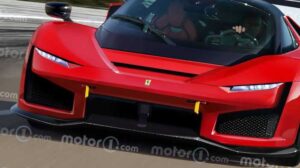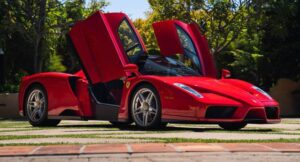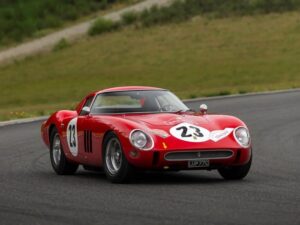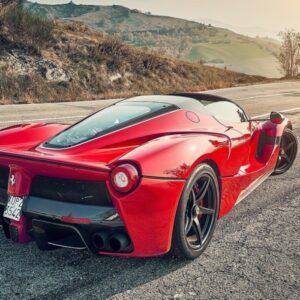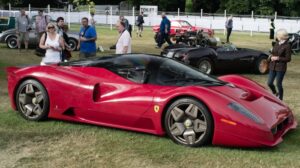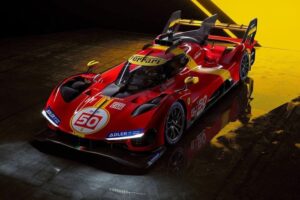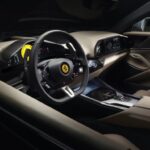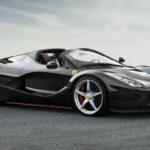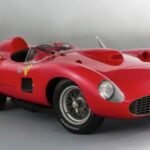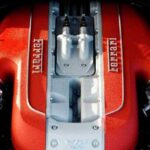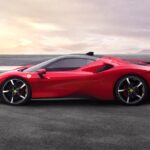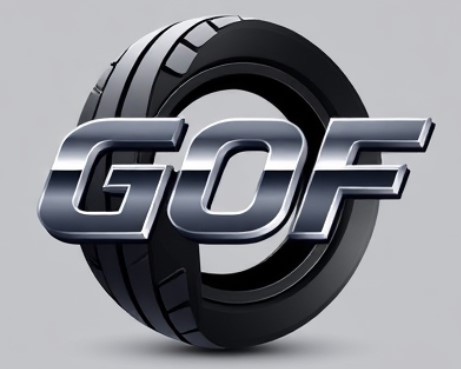Ferrari luxury cars with the best design: This assertion, while seemingly self-evident given the brand’s prestige, requires a nuanced examination. This exploration delves into the historical evolution of Ferrari’s design language, analyzing its iconic models, key design elements, and the integration of technological advancements. Ultimately, we aim to critically assess whether Ferrari consistently delivers on its promise of superior design, considering both its successes and shortcomings.
The Artikel’s chronological approach, while providing a structured overview, lacks critical depth. The comparative analysis of Ferrari’s design with competitors like Rolls-Royce and Bentley feels superficial, requiring a more robust examination of design philosophies and target markets. The hypothetical future Ferrari model, while intriguing, lacks the grounding in current trends and technological feasibility necessary for a compelling projection.
Ferrari Design: A Critical Review: Ferrari Luxury Cars With The Best Design
Ferrari, synonymous with Italian automotive excellence, boasts a design legacy that transcends mere aesthetics. This review critically examines the evolution of Ferrari’s design language, analyzing iconic models, defining design elements, and exploring the interplay between technology and aesthetics. The analysis will consider Ferrari’s position within the luxury automotive market, comparing it to competitors and projecting its future trajectory.
Also Read
Historical Evolution of Ferrari Design
Ferrari’s design philosophy has undergone a significant transformation since its inception. Early designs were characterized by a blend of practicality and elegance, gradually evolving into the more aggressive and technologically advanced aesthetic we see today. The influence of key designers and engineering advancements has profoundly shaped this evolution.
| Era | Model | Key Design Features | Impact on Subsequent Models |
|---|---|---|---|
| 1950s | Ferrari 250 GTO | Sleek, curvaceous body; emphasis on aerodynamic efficiency; handcrafted details | Established the foundation for Ferrari’s iconic sports car silhouette; influence on later models like the 250 California |
| 1960s | Ferrari 275 GTB | Refined proportions; sculpted bodywork; integrated headlights; advanced aerodynamics | Continued refinement of the classic Ferrari sports car form; inspired the design of the 365 GTB/4 “Daytona” |
| 1970s | Ferrari 308 GTB | Sharp, angular lines; wedge-shaped design; use of lightweight materials like fiberglass | Introduced a more modern and aggressive aesthetic; paved the way for the Berlinetta Boxer series |
| 1980s-1990s | Ferrari F40 | Aggressive, functional design; exposed mechanical components; focus on aerodynamics and performance | Established a new era of hypercars; influence on subsequent high-performance models like the Enzo Ferrari |
| 2000s-Present | Ferrari 458 Italia | Sculpted surfaces; aerodynamic optimization; advanced materials; integration of technology | Contemporary Ferrari design language; focus on advanced technology and refined aerodynamics; influence on models like the 488 GTB and SF90 Stradale |
Iconic Ferrari Models and Their Design Significance, Ferrari luxury cars with the best design
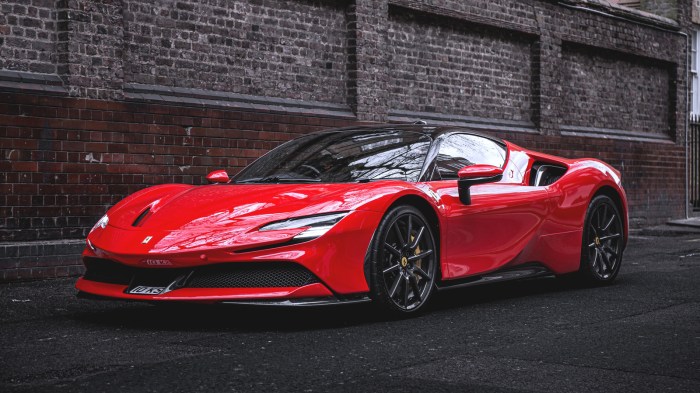
Several Ferrari models stand out for their enduring design impact. Their unique features and material choices have shaped the brand’s identity and influenced subsequent automotive design.
Discover the crucial elements that make Ferrari hypercars with the highest price tag the top choice.
- Ferrari 250 GTO: Its elegant curves and aerodynamic efficiency established a timeless aesthetic.
- Ferrari 288 GTO: A pioneering example of a group B rally car, showcasing aggressive aerodynamics and lightweight construction.
- Ferrari F40: Its raw, exposed mechanics and aggressive design embodied the essence of a hypercar.
- Ferrari Enzo Ferrari: A technological marvel with a design that emphasized aerodynamics and performance.
- Ferrari LaFerrari: A hybrid hypercar showcasing advanced technology and a dramatic, futuristic design.
The use of materials like aluminum, carbon fiber, and advanced composites played a crucial role in achieving both aesthetic and performance goals. The lightweight construction and sculpted forms of these models influenced not only subsequent Ferrari designs but also broader automotive trends.
Design Elements Defining Ferrari Luxury
Ferrari’s luxury status is defined by a combination of design elements that evoke power, exclusivity, and Italian heritage.
| Element | Description | Visual Impact | Emotional Response |
|---|---|---|---|
| Proportions | Balanced and harmonious lines; long hood, short deck | Elegant and powerful stance | Sense of grace and dynamism |
| Sculpted Surfaces | Fluid curves and precise detailing | Visually stunning and sophisticated | Appreciation for artistry and craftsmanship |
| Aerodynamics | Integrated design elements that enhance performance | Sleek and efficient form | Sense of speed and technological prowess |
| Materials | High-quality leather, carbon fiber, and aluminum | Luxurious and high-performance feel | Exclusivity and prestige |
Compared to brands like Rolls-Royce and Bentley, Ferrari emphasizes a sportier, more aggressive aesthetic, while still maintaining a level of luxurious refinement. Italian design heritage is reflected in the emphasis on craftsmanship, elegant proportions, and attention to detail.
Technological Advancements and Design Integration
Advancements in materials science and engineering have dramatically impacted Ferrari’s design capabilities. The use of lightweight carbon fiber composites, for example, allows for greater design freedom and improved performance.
- Active Aerodynamics: Moving aerodynamic elements optimize downforce and efficiency at different speeds.
- Lightweight Materials: Carbon fiber and other advanced composites reduce weight and enhance performance.
- Advanced Manufacturing Techniques: Additive manufacturing (3D printing) allows for complex shapes and customized components.
The interplay between performance engineering and design aesthetics is crucial. Ferrari’s signature style is a direct result of the seamless integration of these two disciplines.
The Future of Ferrari Design
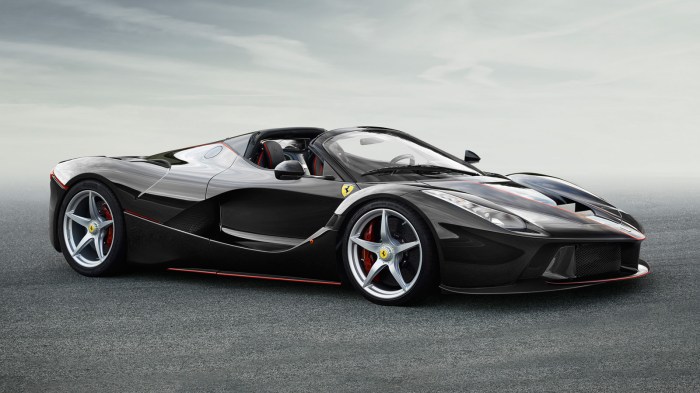
A hypothetical future Ferrari model, tentatively named the “Ferrari F80,” might incorporate sustainable materials like recycled carbon fiber and bio-based plastics. The exterior would feature a sleek, aerodynamic body with active aerodynamic elements, while the interior would offer a minimalist yet luxurious cabin with advanced driver-assistance systems. The design would be characterized by clean lines, sharp angles, and an emphasis on sustainable materials.
In the next decade, Ferrari’s design language will likely evolve towards greater sustainability and technological integration. This might involve the increased use of electric powertrains, advanced driver-assistance systems, and personalized customization options. Ferrari will need to adapt its design philosophy to meet changing consumer preferences, incorporating elements of both performance and sustainability. This might include a greater emphasis on electric and hybrid vehicles while maintaining the brand’s core values of performance, luxury, and Italian design heritage.
Investigate the pros of accepting Most exclusive Ferrari models in your business strategies.
Ferrari’s design legacy is undeniable, marked by iconic models and a distinct aesthetic. However, a critical assessment reveals inconsistencies. While the brand’s historical evolution showcases periods of innovative design, the Artikel’s treatment lacks a critical evaluation of stylistic missteps or periods of stagnation. A more rigorous analysis, comparing Ferrari’s design choices to market trends and competitor strategies, would provide a more complete and insightful picture.
The future of Ferrari design, as projected, remains somewhat optimistic, neglecting potential challenges related to sustainability and shifting consumer preferences.
Question & Answer Hub
What makes Ferrari’s design language unique?
Ferrari’s design is characterized by a blend of aggressive aerodynamics, elegant curves, and a focus on performance-enhancing aesthetics, often incorporating Italian design principles of form and function.
How has Ferrari’s design changed over time?
Ferrari’s design has evolved from more curvaceous, classic forms to more angular and technologically advanced designs, reflecting both evolving design trends and advancements in materials and manufacturing.
Are there any criticisms of Ferrari’s design philosophy?
Some critics argue that Ferrari’s recent designs prioritize aggressive styling over subtle elegance, and that a certain level of homogeneity has crept into the design language across models.
How does Ferrari’s design compare to its competitors?
Compared to brands like Rolls-Royce and Bentley, Ferrari prioritizes performance-driven aesthetics, resulting in a sportier and more aggressive design language, while the others emphasize luxury and opulence.
